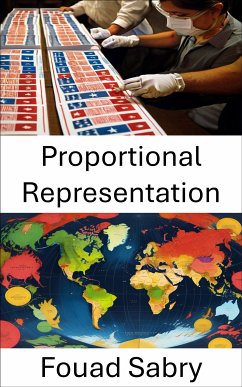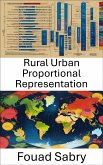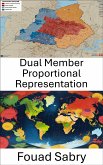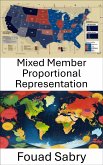Here is the shortened version of your text, keeping it within the required character limits:
Unlock the Power of Fair Representation in Political Science with "Proportional Representation"
This comprehensive guide dives into the world of proportional representation systems, offering insights into electoral fairness, party dynamics, and governance. Perfect for political science professionals, students, and anyone keen on understanding the role of fair representation in shaping political landscapes.
1-Proportional Representation-Uncover the key principles and variations of proportional systems aimed at fairness.
2-Single Transferable Vote-Learn how the Single Transferable Vote reflects voter preferences more accurately.
3-Single Non-Transferable Vote-Understand the strategic importance of Single Non-Transferable Vote in seat allocation.
4-Additional Member System-Explore this hybrid system blending proportional and majoritarian elements.
5-Mixed-Member Proportional Representation-Study the challenges and benefits of this hybrid system.
6-First-Past-The-Post Voting-Examine its simplicity and potential for skewing results compared to proportional systems.
7-Electoral Reform in New Zealand-Analyze New Zealand's transition to a proportional electoral system.
8-Parallel Voting-Explore the combination of proportional and majoritarian elements in Parallel Voting.
9-Electoral District-Delve into how electoral districts impact proportional representation.
10-Issues Affecting Single Transferable Vote-Learn about the criticisms and ongoing debates regarding this system.
11-Multiple Non-Transferable Vote-Understand its impact on election outcomes and voter strategy.
12-Electoral Reform-Study global efforts to achieve more equitable representation through reform.
13-Semi-Proportional Representation-Discover systems attempting to balance proportional and majoritarian features.
14-Electoral System-Explore various electoral systems and their influence on democratic governance.
15-Dual-Member Proportional Representation-Examine the potential of this innovative system for enhancing fairness.
16-Mixed Electoral System-Compare systems that integrate both proportional and majoritarian methods.
17-2018 British Columbia Electoral Reform Referendum-Reflect on this pivotal moment for proportional representation in Canada.
18-Rural–Urban Proportional Representation-Investigate how geographic disparities are addressed in proportional systems.
19-Mixed Single Vote-Study how this system merges plurality and proportional elements.
20-Mixed Ballot Transferable Vote-Explore this innovative approach to proportional voting.
21-Mixed-Member Majoritarian Representation-Learn about this system's balance of majoritarian and proportional features.
This book answers common questions about proportional representation, offering far more value than its price through in-depth analysis and validation. Dive deep into this key area of political science and enhance your understanding of electoral systems.
Unlock the Power of Fair Representation in Political Science with "Proportional Representation"
This comprehensive guide dives into the world of proportional representation systems, offering insights into electoral fairness, party dynamics, and governance. Perfect for political science professionals, students, and anyone keen on understanding the role of fair representation in shaping political landscapes.
1-Proportional Representation-Uncover the key principles and variations of proportional systems aimed at fairness.
2-Single Transferable Vote-Learn how the Single Transferable Vote reflects voter preferences more accurately.
3-Single Non-Transferable Vote-Understand the strategic importance of Single Non-Transferable Vote in seat allocation.
4-Additional Member System-Explore this hybrid system blending proportional and majoritarian elements.
5-Mixed-Member Proportional Representation-Study the challenges and benefits of this hybrid system.
6-First-Past-The-Post Voting-Examine its simplicity and potential for skewing results compared to proportional systems.
7-Electoral Reform in New Zealand-Analyze New Zealand's transition to a proportional electoral system.
8-Parallel Voting-Explore the combination of proportional and majoritarian elements in Parallel Voting.
9-Electoral District-Delve into how electoral districts impact proportional representation.
10-Issues Affecting Single Transferable Vote-Learn about the criticisms and ongoing debates regarding this system.
11-Multiple Non-Transferable Vote-Understand its impact on election outcomes and voter strategy.
12-Electoral Reform-Study global efforts to achieve more equitable representation through reform.
13-Semi-Proportional Representation-Discover systems attempting to balance proportional and majoritarian features.
14-Electoral System-Explore various electoral systems and their influence on democratic governance.
15-Dual-Member Proportional Representation-Examine the potential of this innovative system for enhancing fairness.
16-Mixed Electoral System-Compare systems that integrate both proportional and majoritarian methods.
17-2018 British Columbia Electoral Reform Referendum-Reflect on this pivotal moment for proportional representation in Canada.
18-Rural–Urban Proportional Representation-Investigate how geographic disparities are addressed in proportional systems.
19-Mixed Single Vote-Study how this system merges plurality and proportional elements.
20-Mixed Ballot Transferable Vote-Explore this innovative approach to proportional voting.
21-Mixed-Member Majoritarian Representation-Learn about this system's balance of majoritarian and proportional features.
This book answers common questions about proportional representation, offering far more value than its price through in-depth analysis and validation. Dive deep into this key area of political science and enhance your understanding of electoral systems.








